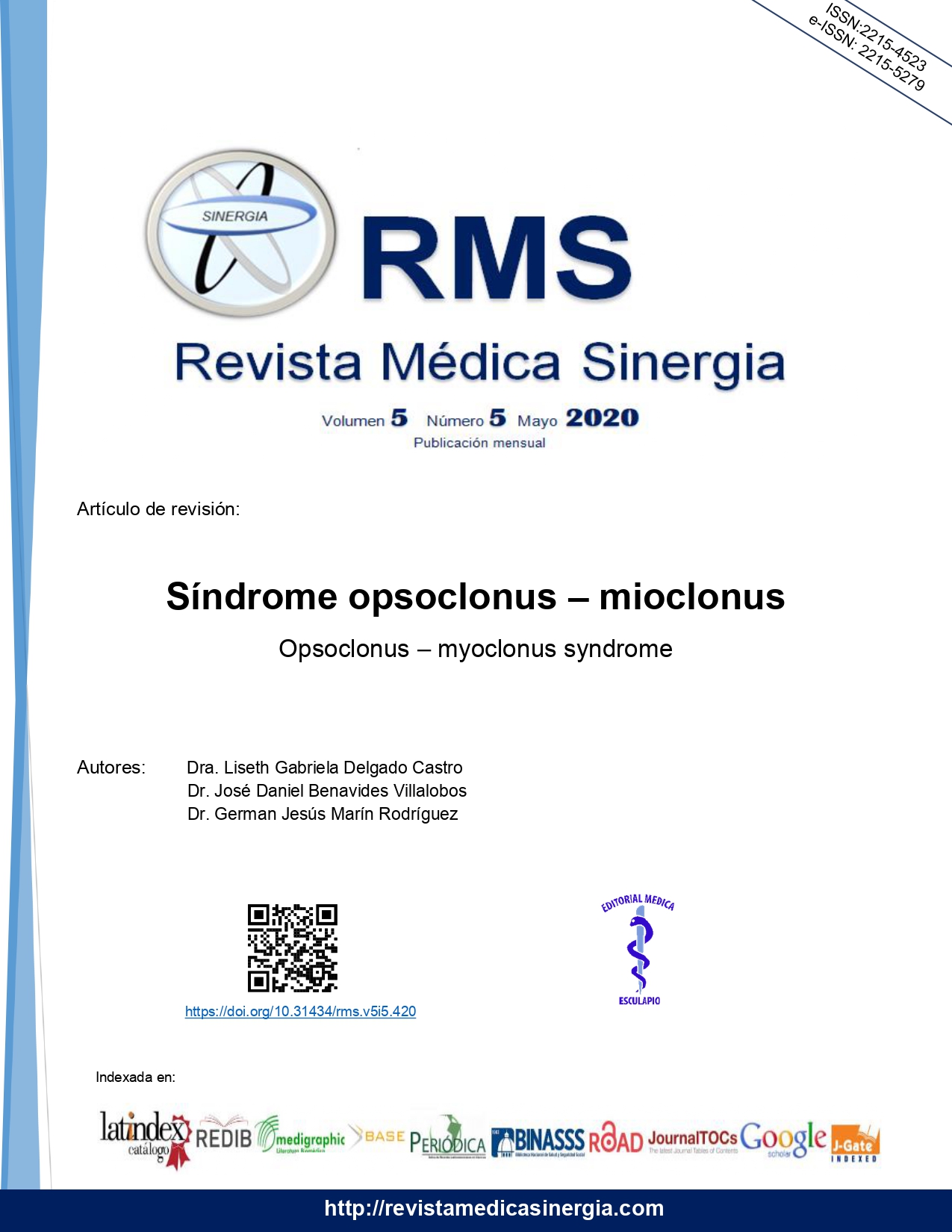Abstract
The opsoclonus-myoclonus syndrome is a rare medical condition associated with an autounmmune etiology, it can be paraneoplasic, parainfectios or idiopatic. The patients present with truncal and limb ataxia, falls, opsocolunus and myoclonus. Also they could present a certain degree of encephalopathy, cerebelar damage signs and sleep disturbances. In the case of the pediatric population an evaluation for neuroblastoma must be done; in adults presenting with encephalopathy a complete evaluation must be done looking an underlying neoplasia. The acute neurological symtomps can be controlled with immunotherapy and there have been a partial response to the antitumoral medication, but the long term outcome is characterized for the presence of neuropsicological deficit.
Keywords
References
Oh S, Kim J, Dieterich M. Update on opsoclonus–myoclonus syndrome in adults. Journal of Neurology. 2019; 266(6): 1541-1548. https://doi.org/10.1007/s00415-018-9138-7
Chekroud A, Anand G, Yong J, Pike M, Bridge H. Altered functional brain connectivity in children and young people with opsoclonus-myoclonus syndrome. Developmental Medicine & Child Neurology. 2016; 59(1): 98-104. https://doi.org/10.1111/dmcn.13262
Pranzatelli M, Tate E, McGee N. Demographic, Clinical, and Immunologic Features of 389 Children with Opsoclonus-Myoclonus Syndrome: A Cross-sectional Study. Frontiers in Neurology. 2017; 8. https://doi.org/10.3389/fneur.2017.00468
Stewart K, Lee J, Stuart G. Paraneoplastic opsoclonus-myoclonus syndrome as a presentation of high grade serous ovarian cancer. Gynecologic Oncology Reports. 2019; 30: 100511. https://doi.org/10.1016/j.gore.2019.100511
Radu R, Terecoasă E, Ene A, Băjenaru O, Tiu C. Opsoclonus-Myoclonus Syndrome Associated With West-Nile Virus Infection: Case Report and Review of the Literature. Frontiers in Neurology. 2018; 9. https://doi.org/10.3389/fneur.2018.00864
Pranzatelli MR, Tate ED, McGee NR. Multifactorial analysis of opsoclonus-myoclonus syndrome etiology (“Tumor” vs. “No tumor”) in a cohort of 356 US children. Pediatric Blood Cancer. 2018; 65(8): 1-12. https://doi.org/10.1002/pbc.27097
Blaes F, Dharmalingam B, Childhood opsoclonus-myoclonus syndrome: diagnosis and treatment. Expert review of neurotherapeutics. 2016; 16(6): 641-8. https://doi.org/ 10.1080/14737175.2016.1176914
Huddar A, Bindu PS, Nagappa M, Bharath RD2, Sinha S, Mathuranath PS, Taly AB. Pediatric opsoclonus-myoclonus-ataxia syndrome: Experience from a tertiary care university hospital. 2018; 66(5): 1332-133. https://doi.org/10.4103/0028-3886.241404
Lizarraga KJ, Heros DO, Adams D, Lang AE, Kanner M . Opsoclonus-myoclonus-encephalopathy induced by cefepime. Journal of the neurological sciences. 2019; 396: 33-35. http://doi.org/10.1016/j.jns.2018.10.028
Necpál J , Skorvanek M.Opsoclonus-myoclonus ataxia syndrome secondary to venlafaxine intoxication. Journal of the neurological sciences. 2017; 372: 19-20. https://doi.org/10.1016/j.jns.2018.10.028
Gorman MP. Update on diagnosis, treatment, and prognosis in opsoclonus–myoclonus–ataxia syndrome. Current opinion in pediatrics. 2010; 22(6): 745-50. https://doi.org/10.1097/MOP.0b013e32833fde3f
Rodríguez DA, Gelvez JD. Síndrome opsoclonus mioclonus paraneoplásico en pediatría: reporte de caso y revisión de la literatura. Acta Neurol Colomb. 2015; 31(2):209-213. https://doi.org/10.22379/2422402230
Galstyan A, Wilbur C, Selby K, Hukin J. Opsoclonus-myoclonus syndrome: a new era of improved prognosis? Pediatric Neurology. 2017; 72:65-69. https://doi.org/10.1016/j.pediatrneurol.2017.03.011
Armangué T, Sabater L, Torres-Vega E, et al. Clinical and Immunological Features of Opsoclonus-Myoclonus Syndrome in the Era of Neuronal Cell Surface Antibodies. JAMA Neurol. 2016; 73: 417. https://doi.org/10.1001/jamaneurol.2015.4607
Hasegawa S, Matsushige T, Kajimoto M, et al. A nation wide survey of opsoclonus-myoclonus syndrome in Japanese children. Brain Dev. 2015; 37: 656. https://doi.org/10.1016/j.braindev.2014.10.010
Schleiermacher G, Hero B. Update on Pediatric Opsoclonus Myoclonus Syndrome. Neuropediatrics. 2013; 44(06): 324-329. https://doi.org/10.1055/s-0033-1358604
Wilbur C, Yea C, Licht C, Irwin M, Yeh E. An upfront immunomodulatory therapy protocol for pediatric opsoclonus‐myoclonus syndrome. Pediatric Blood & Cancer. 2019; 66(8). https://doi.org/10.1002/pbc.27776
Mitchell W, Wooten A, O’Neil S, Rodriguez J, Cruz R, Wittern R. Effect of Increased Immunosuppression on Developmental Outcome of Opsoclonus Myoclonus Syndrome (OMS). Journal of Child Neurology. 2014; 30(8): 976-982. https://doi.org/10.1177/0883073814549581
Dulac O, Lassonde M, Sarnat H. Pediatric Neurology, Part II. 3rd ed. Burlington: Elsevier Science; 2013.


